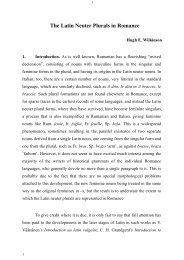the vulgar latin (proto-romance) conjugation system - Page ON
the vulgar latin (proto-romance) conjugation system - Page ON
the vulgar latin (proto-romance) conjugation system - Page ON
Create successful ePaper yourself
Turn your PDF publications into a flip-book with our unique Google optimized e-Paper software.
states (From Latin to Portuguese) that all -er verbs in Ptg. had <strong>the</strong> past<br />
participle in -udo, apart from those with strong past participles; <strong>the</strong> -udo<br />
ending lasted into <strong>the</strong> 15th c., and some fossilized forms, teudo, conteudo,<br />
manteudo, still remain. In Sp. it was not so long lasting, <strong>the</strong> Cid already<br />
having -ido forms beside -udo, but -udo is still found through <strong>the</strong> 13th and<br />
14th c.; after that its use waned, and it had completely disappeared by <strong>the</strong><br />
16th c. (Bourciez, 365). (The -uto formation seems not to have penetrated<br />
into Mozarabic, which has ronpito, miššita.)<br />
Of <strong>the</strong> strong past participles, rema(n)su remained everywhere: Rum.<br />
rămas, It. rimaso (later rimasto by analogy with posto), OEngad. armes, Fr.<br />
remes, Prov. remas (and remasut), Cat. romas, Sp., Ptg. not recorded but to<br />
be presumed from <strong>the</strong> perfects remase, remas. Fr. somons, Prov.<br />
somos/somost are formed on <strong>the</strong> analogy of <strong>the</strong> similar forms from<br />
respondre, which in turn followed repondre. A similar semosi is found in<br />
Old Genoese.<br />
Sedere generally has <strong>the</strong> past participle in -utu, including Prov., Cat.<br />
(as)segut, OSp. seudo and a rare form su and dial. assëu in OFr. (Fouché,<br />
190), but <strong>the</strong> usual participle in OFr. is sis, which may, like <strong>the</strong> perfect, be<br />
derived from a compound form *assisu (as risu, occisu), which gives It.<br />
assiso, Fr., Prov. assis. Videre, besides <strong>the</strong> -utu participle, found in Rum.,<br />
It., Rh.-Rom., Fr., Prov., Ptg., had a form *visĭtu (originally formed on<br />
visere, perhaps), giving It., Sp., Ptg. visto, Prov., Cat. vist, Sard. vistu, and<br />
<strong>the</strong> Fr. adverb vite from OFr. viste (*visĭta). Old visu survives in OIt. and It.<br />
dialects, OFriul., OFr., Prov. and Engad. (Lausberg, 917), generally in a<br />
passive construction meaning ‘it seems’. It is also found universally as a<br />
noun, sometimes with <strong>the</strong> sense of ‘face’, cf. Fr. vis-à-vis. Compare also <strong>the</strong><br />
fossilised forms It. avviso, Sp., Ptg. aviso, Fr., Prov., Cat. avis.<br />
Conjugation III.<br />
24<br />
24









